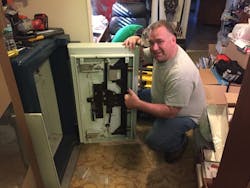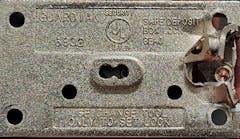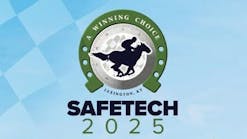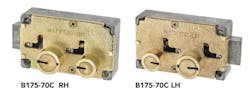Joe Reustle began his locksmithing career in October 1991 through a coop arrangement while attending a local vocational/tech high school. I first me him in 1993. During this interview I got to learn more about Joe and how he got to be one of the safe gurus of our industry.
His business is JR’s Lock & Safe in New Jersey. He’s a GSA certified safe technician as well as an instructor for SAVTA and ALOA. Joe also currently serves on SAVTA’S board of directors.
How long were you there at that first locksmith shop?
I was there until 1997 when I went to work for Safemasters where I was hired to do material coordination/purchasing. I left there and went back to work for Chuck until I left in 1999.
So, you spent eight years working for a couple of lock shops and you weren’t specializing in any area then?
I was doing everything: Access Control, safe openings, commercial work, automotive. We did it all.
You consider yourself a safe specialist now; how did that happen?
That happened when I decided to start my own business. I was looking at everyone fight over a $55 service call to go unlock a car. I was looking to distinguish myself from the everyday locksmith and find a niche that was less competitive and that’s when I decided to specialize in safe work.
What were you best at while working for a full-service locksmith shop? Was there work you enjoyed doing more than the rest?
I enjoyed the safe work although it wasn’t my passion yet. Access Control was more my passion then. More in depth than just installing card swipe stuff. Request to exit, first person in, setting up relays that would activate other functions. If they put their alarm code in, it would shunt the door open; that’s what I really enjoyed doing then. But we did everything including rekeying and installing residential hardware, cut lots of keys and rekeyed auto locks. My chubby hands didn’t help with that kind of work.
As far as basic skills, in the 90’s if you could impression or sight-read keys, that went a long way. We didn’t have Lishi picks, so skill was important. Not to toot my own horn but I was very skilled at impressioning, etc.
What went into your decision to specialize in safe work? Was it simply how you wanted to spend your time?
Time and monetary investment, proper tooling. My thing is that if I’m going to do something, I want to put in 110%. I don’t want to show up at a job and tell them I’m not prepared and have to come back.
Did you make the decision to about your own business while you were still employed? Had you been planning this for a while?
I was not employed at the time by my choice. I wasn’t yet thinking of my own business and I tried working for a local distributor. I quickly discovered I didn’t enjoy spending my time at a desk and on the phone all day. I had the product knowledge to do the job but would rather be on the road doing the work.
My biggest downfall is that I’d rather be performing the actual work than taking care of the business aspect of things. Now I’m very thankful to have my wife who takes care of all the business paperwork.
What inspired you to finally go into business for yourself?
I saw how much money I was able to bring in for other people and figured ‘why am I doing this without reaping the benefits for myself?’ Now I get to keep what I make, less the expenses of course. My business is called JR’s Lock & Safe because when I started, I wasn’t yet able to turn down work although I knew my target market was going to safes.
At what point were you able to be pickier and take primarily safe jobs?
The Access Control market was being flooded by the burglar alarm technicians as well as other locksmiths and system integrators. I needed to find my niche. I dove heavily into educating myself. Dave McOmie had his safe opening parties or penetration parties as they were called. I kind of overdid it but I invested a huge amount of time and money in my safe education.
Did you do this because you enjoyed it so much or just because you wanted to be as prepared as possible?
I enjoyed it. Every safe was a challenge. What was good about taking classes all over the country was that different regions were more familiar with different safes. On the east coast you saw more Gardall and AMSEC was seen more out west. By traveling so much I got to see different styles of safes like Gary, Adesco and others. This way I was prepared for whatever I might encounter. Same thing with antique safes; because back in the day we used horse and buggy instead of vehicles you had certain safes in certain regions only.
After investing so much time and money, how did you know it would pay off, or did you?
Because I’m in the Philadelphia area market, I was confident there’d be enough work. I couldn’t say the same if I was somewhere like Idaho. Within a 90-minute drive there’s more than 10 million people so this market could sustain a safe only company. I do a little bit of commercial work but it’s not my focus. I don’t even advertise anymore; all my business is word of mouth.
How long did it take to get to the point of not needing to advertise?
I stopped paying for advertising about five years ago. My jobs come from referrals. I spoke with a customer yesterday who said three different places he called all gave him my name. Obviously, I’m doing something right. I don’t see locksmiths as competitors but as opportunities for more work. Being a member of local organizations and networking with locksmiths you can complement each other instead of competing.
Do you ever have enough work that causes you to consider hiring someone or do you enjoy doing it all yourself?
After managing two different lock shops, my experience with employees has been that they’re often not there when you need them. My philosophy about life is that you work to live, not live to work. I can take on more work than I do but I also enjoy ‘me time’. The downside is not making money when I take time off, but I can control the quality of the work.
Do you see yourself taking on a young person as an apprentice sometime in the future who could possibly take over?
I really don’t see it. It’s difficult to find young people interested in working with their hands. I see it in other industries where I have friends who are business owners -- same problem. They seem to want office jobs. There’s an opportunity; look at the locksmiths we’ve lost in the past year or so. Existing companies are going to become busier and the demand for our labor will increase and we’ll be able to charge more; supply and demand.
As a safe specialist, would you recommend it to others?
I would recommend the safe industry or any other niche market that satisfies you. I’m very intrigued by the automotive locksmithing with the newer technologies based on prox technology, etc. To be an automotive locksmith efficiently you’re looking at substantial investments in tooling. As I’ve said, I’m a firm believer in education.
How much of your knowledge would you say comes from the formal education versus experience in the field?
I’d say 50/50 but the classroom learning gives you the confidence to go out and tackle jobs and that’s important. Factory certifications and drilling parties for example give you lots of confidence and experience. Now if I’m called to work on a safe I’ve never seen before and I don’t have info in my data base, I can take an educated guess based on what I’ve learned. I’m also a firm believer in having a Plan A, B and C. Plan A may not always work and if you don’t have a plan B, you’re stuck. Tunnel vision can cost you lots of time.
What does most of your work consist of these days?
Of the safe openings, about 60% are because of malfunctions as opposed to a lost combo. The reason for most malfunctions is that electronic locks are being used. Not to knock any product but it’s not a question of ‘if’ it will fail but ‘when’ it will fail if it’s electronic. Mechanical locks have been around since roughly the 1860’s. When they fail you can typically figure out the problem.
So how much of your time goes into opening and servicing safes? Do you sell them as well?
I do not sell or move safes. I don’t sell them because the profit margin is too low. Back in the day you could double your cost. Now with the internet you’re working on a very low profit margin and to me it’s not worth it. I’m servicing only; changing combinations and openings.
If I did have employees, I’d try to have specialists. Maybe I’d have one person doing automotive while another did automotive.
One problem I see is proper inventory in each truck. If we’re doing everything, then there’s enough room and money to keep a smattering of the more common items you’ll need.
As a specialist you can keep almost anything you might need when driving out to a job.
I might go out to open a Sentry safe and then get a call to go do a TRTL30X6. It’s fine because I know I have everything in my truck.
Steve Kaufman
Steve Kaufman has worked for distributors in the locksmith industry since 1993 and worked as a full-time locksmith from 1978 through the 1980s. Kaufman is the sales manager for IDN Hardware out of its Philadelphia location.






